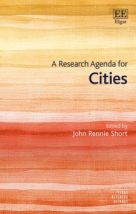A Research Agenda for Cities

This edited collection seizes upon what its editor calls “the urban moment”, to address some of the most pressing issues affecting cities worldwide. These include globalization, surveillance, feminism, gentrification and sustainability. The case study chapters focus on cities in Colombia, Brazil, China, India, Singapore, sub-Saharan Africa, the Middle East and North Africa, Australia, and post-Soviet regions.
A Research Agenda for Cities does not claim to be comprehensive. Rather, the aim is to give the flavour of contemporary debates in urban studies, which show the range of ways that the modern city can be analysed. What these diverse chapters share is a concern with exclusion and power relations – interrogating who loses and who gains from urban changes and ways of conceptualizing those changes.
For instance, the chapter on the creative city challenges the idea that creativity is uniformly promising for urban economic revival, pointing out that different versions of creativity (e.g. artists vs. technologists) shape different kinds of economic relations. As well (page 147):
“much of the machinery of cultural production is arrayed within clusters within or adjacent to vulnerable, low-income and formerly marginalized communities. The cultural capital generated by these activities is also successfully appropriated by developers, property firms and marketing agencies to expedite the revalorization of urban space, facilitating in turn a potent upgrading process which produces both direct social displacement and dislocation.”
This idea that valorizing certain spaces leads to commodifying them, and excluding certain groups from the attendant benefits, shows up again and again. The chapter on sexuality and the city, for example, notes that the marketing of urban gay districts in Western cities tends to benefit and seek out a certain white, male, middle-class and monogamous type.
Together, these chapters show how contested urban change is…or should be.
Further reading:
Environment and Urbanization (2013), “Gender and urban change”, Vol 25, No 1, available at http://journals.sagepub.com/toc/eaua/25/1.
Satterthwaite, David (2016), “A new urban agenda?”, Environment and Urbanization Vol 18, No 1, pages , available at http://journals.sagepub.com/doi/full/10.1177/0956247816637501.
Varley, Ann (2010), “Postcolonialising informality?”, N-AERUS, available at http://n-aerus.net/web/sat/workshops/2010/pdf/PAPER_varley_a.pdf.
Book note prepared by Christine Ro
Search the Book notes database
Our Book notes database contains details and summaries of all the publications included in Book notes since 1993 - with details on how to obtain/download.
Use the search form above, or visit the Book notes landing page for more options and latest content.
For a searchable database for papers in Environment and Urbanization, go to http://eau.sagepub.com/

